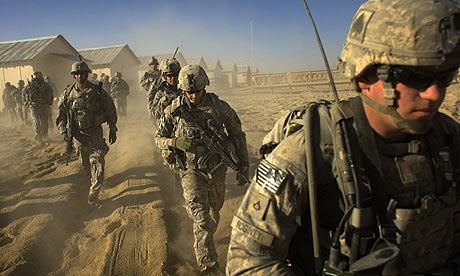
US troops set out on a patrol in Paktika province, Afghanistan. Photograph: David Furst/AFP/Getty Images
David Kilcullen, one of the world's leading authorities on counter-insurgency and an adviser to the British government as well as the US state department, said Obama's delay in reaching a decision over extra troops had been "messy". He said it not only worried US allies but created uncertainty the Taliban could exploit.
Speaking in an interview with the Guardian, he compared the president to someone "pontificating" over whether to send enough firefighters into a burning building to put a fire out.
He was speaking as Obama left Washington for a nine-day trip to Asia without announcing a decision on troop numbers. The options being considered by the US have been narrowed down to four: sending 10,000, 20,000, 30,000 or 40,000, the latter the figure requested by the Nato commander in Afghanistan, General Stanley McChrystal. These would be on top of 68,000 US troops already deployed.
The deep divisions with the Obama administration were exposed yesterday by leaked diplomatic cables from the US ambassador in Afghanistan, Karl Eikenberry, who urged Obama to ignore McChrystal's request unless the Afghan president, Hamid Karzai, cleaned up his corrupt government.
Kilcullen expressed concern that Obama might deny McChrystal the 40,000 extra troops and split the difference between the four options, the kind of fudge common in domestic politics.
"Time is running out for us to make a decision. We can either put in enough troops to control the environment or we can credibly communicate our intention to leave. Either could work. Splitting the difference is not the way to go," Kilcullen said.
"It feels to me that all these options are dangerously close to the middle ground and we have to consider whether the middle ground is a good place to be. The middle ground is a good place on domestic issues, but not on strategy. You either commit to D-Day and invade the continent or you get Suez. Half-measures end up with Suez. Do it or not do it."
Kilcullen, though employed by the state department and various Nato governments, stressed he was speaking in a private capacity. A former Australian army officer, he is based in an office outside Washington and has served in various capacities in the US government, including as an adviser to General David Petraeus, the overall US commander. He is coy about the extent of his involvement but, apart from paid consultancies, his views are regularly sought by senior figures at the Pentagon and elsewhere in the administration.
He said it would be irresponsible to opt for a halfway house in which extra troops were sent in but not enough to secure Afghanistan, which seemed to be the way the administration was headed. He noted that Obama, in a speech to troops in Jacksonville, Florida, a fortnight ago, had said he would never lightly put them in harm's way.
"That's not the situation we are in. As an analogy, you have a building on fire, and it's got a bunch of firemen inside. There are not enough firemen to put it out. You have to send in more or you have to leave. It is not appropriate to stand outside pontificating about not taking lightly the responsibility of sending firemen into harm's way. Either put in enough firemen to put the fire out or get out of the house. That is my analogy of where we are. Either of those approaches could potentially work."
He added: "If you have 40,000 troops it would be do-able. Anything less than 25,000 is throwing good money after bad."
Kilcullen supports the idea, pushed by British commanders, of protecting places where the population live rather than attempting to secure all territory.
There is media speculation in Washington that Obama may divert from his Asian trip to Kabul to confront Karzai. Kilcullen argues there is a need for Obama to exert leverage over the Afghan president by issuing a credible threat to pull out all US troops unless he cleans up corruption.
The White House line at present is that leaving is not an option. But Kilcullen said there was a vicious cycle that began with government corruption, creating the space for the Taliban to expand. There were two ways of getting leverage: one, of having enough troops in the country, and the other threatening to leave, as the US had done in Iraq.
"Our way out is to go to Karzai and say 'We are done here'. We will be leaving in two to five years. If you do not want to be left hanging from a lamppost, like Najibullah [the former Afghan president hanged in Kabul in 1996 when the Taliban took control], this is what you need to do. I think that would work," Kilcullen said.
He was critical of the delay in reaching a decision. "I do think, though, the policy process of this administration this year has been, shall we say, messy and this, the latest incident [the leaked diplomatic cables], underlines how messy it has been, and I think that is problematic.
"It sends a message of indecision and uncertainty which has an effect on allies, and has a huge effect on the British political debate and has huge impact on the Afghans."
No comments:
Post a Comment